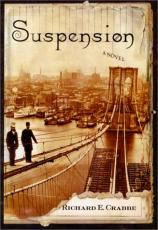Suspension
Review
Suspension
I love the story behind the story. One of my favorites is the story of how Stephen King came to write CARRIE. He had a summer job working as a high school custodian and...oh, go read ON WRITING, because there he tells it better than I ever could.
My new favorite story of inspiration concerns a gentleman named Richard E. Crabbe and how he came to write his first novel, entitled SUSPENSION. Crabbe, an advertising salesman, is a daily commuter on the Staten Island ferry. He became fascinated with the Brooklyn Bridge as a result of this daily routine, and this fascination became the inspiration for SUSPENSION. Crabbe began to do research on the Brooklyn Bridge, its origin, design, and construction, and then began writing SUSPENSION --- in longhand --- during the course of his daily commutes.
Now, SUSPENSION isn't perfect. The pacing loses a step here and there, and Crabbe needs to work a bit on the relationships among his characters. But this is a great book, nonetheless. It is tough for even a veteran author to pen a historical mystery, let alone lay one down right out of the blocks; and while Crabbe's reach may occasionally exceed his grasp, most of the time he has things firmly in hand.
Let's look at Crabbe's research. Everything you would want to know about the Brooklyn Bridge, its whys and wherefores and how-tos, is right here. What is fascinating is that even if you never even thought about the Brooklyn Bridge, Crabbe makes you care about it over the course of the novel. This is a neat --- and tough --- trick, but Crabbe manages just right, spooning out the factoids so smoothly and quietly that the reader never even feels them slipping into the brain cells while they work their magic. Crabbe does the same thing while bringing the reader up to snuff on the social and political conditions of post-Civil War New York. Again, Crabbe never jams this down the reader's throat, nor does he preach; he simply describes the times and lets the readers draw their own conclusions.
SUSPENSION, incidentally, deals with terrorism. A group of Southern soldiers, smoldering over personal and political losses during the Civil War, plans to destroy what they see as the ultimate symbol of hated Yankee oppression: the newly built and soon-to-open Brooklyn Bridge, the greatest architectural accomplishment of the North, in the greatest city of the North. Sergeant Detective Tom Braddock, a New York City police officer, slowly stumbles onto the plot while investigating a murder. Braddock is not brilliant, and he knows it; what he lacks in intellectual capacity he makes up for with dogged tenaciousness. Crabbe develops Braddock's character quite nicely, taking great pains not to make him too good. Braddock's principles are occasionally sacrificed on the altar of his own advancement; to his credit, he does feel guilty about it. He is simply living in a time when certain ethics were a luxury that few could afford. The counterplay between Braddock's ethics and his ability to do his job effectively and successfully provides some of the most interesting, but not by any means only, compelling moments of SUSPENSION.
Another fascinating element of SUSPENSION is how Crabbe manages to resolve what I call "The Jackal Problem." Everyone who picked up THE DAY OF THE JACKAL knew beforehand that Charles DeGaulle was not assassinated. How, then, could a story about his attempted assassination be made interesting, when everyone knew the ending. Crabbe meets a similar problem in SUSPENSION head on. The Brooklyn Bridge was not blown up by terrorists; how this was prevented, at least in Crabbe's history, makes for compelling reading. The reader knows how the Brooklyn Bridge fares --- it is the detail of how everyone else comes out that makes SUSPENSION a winner.
I don't know if Crabbe has another book lurking inside him. Anything with his name on it would certainly be worth a look on the basis of SUSPENSION. Let's hope that he finds another method of getting to work, and works it into another fascinating tale.
Reviewed by Joe Hartlaub on November 1, 2000




